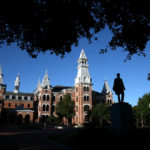Posted: 10/3/03
LifeWay Family Bible Series for Oct. 12
The Holy Spirit: Invisible source of eternal life
John 3:1-8; Romans 8:1-11
By David Jenkins
New Hope Baptist Church, Big Sandy
Even for those who have experienced the new birth, the miracle of regeneration is a mystery. We can only accept by faith what God, through his Spirit, has brought to pass within us. The mystery is compounded by the fact that an all-righteous God who cannot look upon sin condescended to love mankind enough to provide redemption and everlasting life for those who will accept his free gift.
In this second study session dealing with the role of the Holy Spirit in God's plan of salvation, we will review the winsome way Jesus introduced the Holy Spirit to a dignified, astute theologian and teacher of the law in John 3. Then we will observe the Apostle Paul's magnificent explanation of the part the Spirit plays in setting us free from the curse of sin and death in Romans 8.
 |
The holy wind of God
Most likely, Nicodemus had been among the “many” who witnessed the miracles Jesus had performed in Jerusalem and “believed in his name” because of these signs (John 2:23-24). Jesus knew their hearts and was aware their reaction was more related to sensationalism than to a genuine heart belief. Though Jesus began a relationship with Nicodemus that progressed all the way to the cross (see 7:50 and 19:39), the important thing here is the summary of Jesus' gospel that appears in and following this conversation.
In his brief introduction, John reported Nicodemus belonged to the sect of the Pharisees and was a ruler of the Jews. As a Pharisee, Nicodemus placed great importance on the strictest outward observance of the law. The Pharisees were meticulous in observing ceremonies, fasting, almsgiving, long prayers and tithing. As a ruler of the Jews, he also was a member of the Sanhedrin (see 7:50).
Nicodemus, courteous in his approach to Jesus, showed no hostility. Probably he had anticipated a long, involved discussion with Jesus about his interpretation of the law. Obviously, he was taken aback by Jesus' abrupt statement about being born from above. Jesus wanted Nicodemus to understand that the new birth involved a transformation in which one received a new nature and the gift of everlasting life.
The Jews, particularly the Pharisees, anticipated a Messianic kingdom, for they felt they were entitled to a place in it. Against this background, Jesus made his straightforward statement to Nicodemus. Jesus' insistence that one must be born “of water and the Spirit” has been interpreted in different ways. Some say the water refers to natural birth, accompanied by watery fluid. Others see “water” as a symbol of the Spirit (7:37-39). Still others think Jesus referred to John the Baptist's emphasis on baptism as a symbol of repentance.
Jesus' message, however, was clear that the new birth comes in response to one's repentance of sin and confession that Jesus Christ is Lord. Jesus then told Nicodemus this miracle was the result of the movement of the Holy Spirit, which is as mysterious as the blowing of the wind. Jesus used a play on words, since the same word translated “spirit” in Hebrew and in Greek is also rendered “wind.” The Holy Spirit, Jesus was saying, is both the source and the implementer of the new-birth experience.
Freedom from sin's bondage
Paul clearly saw the relationship between a life of bondage to sin and a life lived for Christ. He also knew, from experience, that living for Christ can only be done as we live in the strength provided by the Spirit who indwells all believers.
In Romans 7, Paul gave a dismal picture of life lived on the level of the “flesh,” or the self. He saw the impossibility of keeping God's law because of his natural tendency to sin, to disobey God. In that setting, he was indeed a wretched man. Deliberately, he painted that stark backdrop against which he would begin to show how God's Spirit brings freedom from sin's slavery. Romans 8 deals entirely with the work of the Holy Spirit.
Paul drew a clear distinction between those who live according to the dictates of their sinful nature and those who surrender to the Spirit and are thus controlled by him. The law demands righteous living and condemns those who do not meet its conditions. Yet the law, said Paul, could not overcome sin. He thus saw himself as a wretched person, constantly bearing the load of his sin. He could not keep the law and satisfy the demands of a holy and righteous God. God knew this and sent his Son, the only one to whom this mission could be entrusted. Jesus, who came in the likeness of sinful man, lived a sinless life and thus qualified as the only sin offering that would satisfy God's law.
In Christ, God condemned sin, destroyed its power. Through his Son, he blotted out our sin guilt and brought us to himself. The Holy Spirit, then, is the extension of God's presence that brings about the miracle of the new birth within those who respond to his invitation.
Question for discussion
![]() At what point in one's life does the transforming work of the Holy Spirit come into play?
At what point in one's life does the transforming work of the Holy Spirit come into play?













We seek to connect God’s story and God’s people around the world. To learn more about God’s story, click here.
Send comments and feedback to Eric Black, our editor. For comments to be published, please specify “letter to the editor.” Maximum length for publication is 300 words.